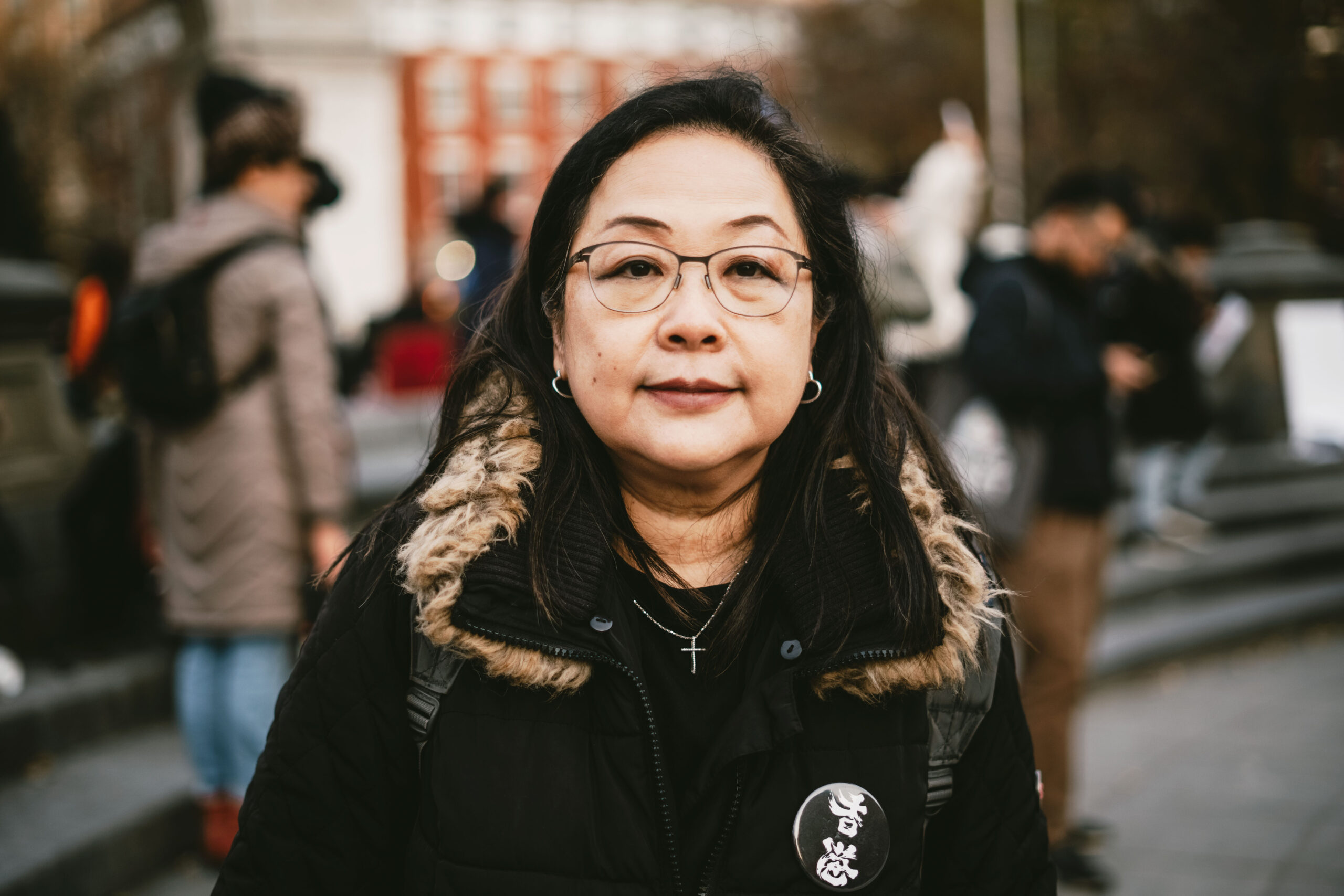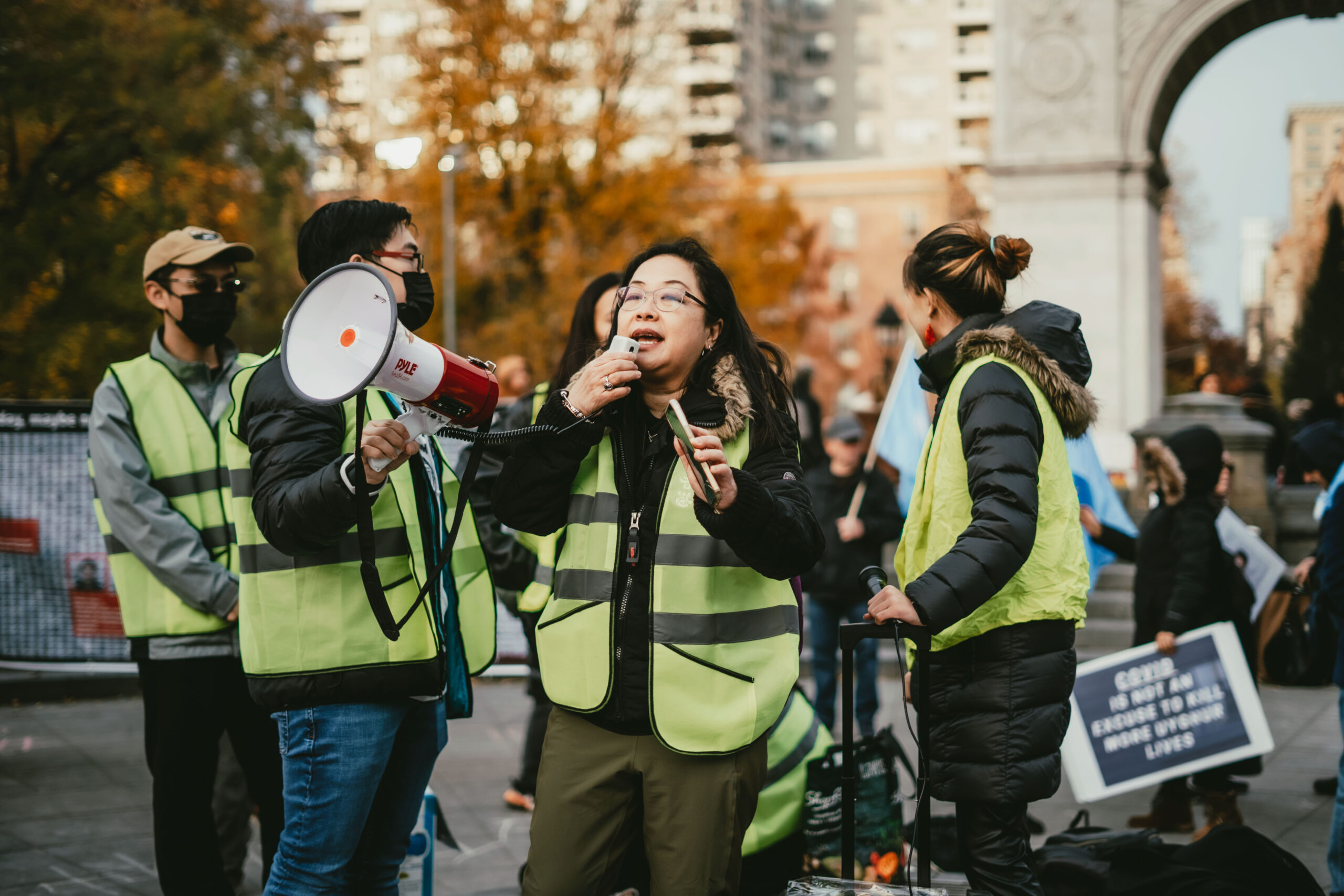The Survivor’s Duty
Hong Kong Exiles in New York
By Keren He
On a flight back to New York from a joyful vacation this August, Anna Cheung burst into tears. She saw, on Facebook, that her friend had been arrested in Hong Kong. She wanted to buy a ticket to Hong Kong immediately but knew she couldn’t.
Cheung was sanctioned by the Chinese government and would be arrested if she arrived at the Hong Kong airport.
“What he did was just that he attended a rally, and his eye got shot during the rally in June 2019. Later he lost his eyesight, and also he lost his job… He was charged, and he was sentenced for nine months,” said Cheung.
Cheung founded NY4HK in 2014, dedicated to helping immigrants from Hong Kong find a new home in New York.

Anna Cheung, founder of NY4HK. Photo by Keren He.
“After 2019, we have quite a few immigrants, and some of them are much younger, and came to New York,” said Cheung.
NY4HK provides clothing, bedding, dishes, sometimes even housing offered by local residents for newer immigrants from Hong Kong. In addition, the organization has connections with some local immigration lawyers who are willing to offer legal help for a very low cost, sometimes even pro bono.
In 2019, a series of protests broke out on the streets of Hong Kong, in response to the government’s attempt to pass an extradition bill, which would allow mainland China to request the extradition of criminal suspects in Hong Kong.
Hong Kong has an independent judicial system from mainland China, most notably that it protects freedom of speech. Many Hong Kong residents were worried that this bill could tarnish this freedom by sending journalists and democracy activists to mainland China.
In response to the numerous protests, the Chinese government imposed the Hong Kong national security law in 2020, which criminalizes rallies and protests against the government or its actions. Most importantly, Beijing has the full power to interpret the law and decide who’s guilty.
“Apparently they have been using that law retrospectively,” said Rebecca Karl, a professor at NYU, who teaches on modern China, gender and social theory.
“The PRC government has been pretty clear that it will use every legal and sometimes illegal mechanism in its power to retrieve these persons and subject them to judicial proceedings, that are, of course, rigged judicial proceedings, since the judiciary is now less and less independent from the government,” added Karl, referring to the protestors and activists that are wanted by the Chinese government.
Many Hong Kong residents who have participated in past rallies or demonstrations tried to flee their home, for fear of legal prosecutions.
Taiwan, a country that’s only 451 miles away from Hong Kong, has shown great sympathy to Hong Kong political refugees, becoming an ideal sanctuary for many of them.
However, the Taiwanese government doesn’t have any asylum laws. Some Hong Kong exiles faced trouble while applying for permanent residency, because the Taiwanese authorities worried about mainland China’s infiltration or provoking Beijing. Except for those who have friends or relatives helping them in Taiwan, most Hongkongers have to turn to other countries.
In 2020, Rep. John R. Curtis of Utah sponsored the Hong Kong Safe Harbor Act, aimed at providing immigration relief and refugee status for residents form Hong Kong who are facing or fearing persecution from the Chinese government. However, Texas Sen. Ted Cruz blocked the bill, citing the possibility of infiltration by spies.
In the following year, President Biden issued a memorandum that protects Hong Kong residents from being deported for 18 months, and the legal relief will end next February.
With all the legal hurdles, Hong Kong refugees didn’t have an easy time finding a new home in New York City.
For those who have a work permit from the government, Cheung and her organization offer connections with local employers who are looking to recruit new workers. Despite some of the Hong Kong refugees coming with a higher education, most of them still have to work a minimum wage job before they can land somewhere else that matches their degrees.
“A lot of time they start with a rather low-end job, working for a restaurant, a waiter or waitress, or service jobs, like a deliverer. Because they think you’re not a United States citizen or green card, you cannot do something very long-term,” said Cheung.
Despite some successful cases, Chueng is not very optimistic about the asylum seeking process. “I told them they could be waiting for five to 10 years… the applications can be rejected, but the lawyers will keep appealing,” said Chueng.
Arthur earned a doctorate degree in Hong Kong. For fear of political persecution, he came to the United States six months ago and applied for asylum. However, he’s still waiting for his work permit and has to rely on his personal savings for now.
“[I] almost used up my savings… no support [from family] at all, supposed to be I support them actually but cannot do that right away,” said Arthur.
In 2019, Cheung and other Hong Kong activists founded Hong Kong Democracy Council, a nonprofit organization based in Washington, D.C. and dedicated to lobbying policy makers and legislators for bills that can help Hong Kong political refugees.
“I also helped host rallies in the past. We also did some advocacy jobs in Washington D.C., when I was the board president of Hong Kong Democracy Council,” said Cheung.

Anna Cheung speaking at a protest in Washington Square Park. Photo by Keren He.
In 2021, the Chinese government imposed sanctions on HKDC, as part of its retaliation on the U.S. government’s sanctions on individuals who are responsible for hurting Hong Kong’s freedom and autonomy. As one of the founders of HKDC, Cheung was also on Beijing’s sanction list and can no longer return home.
However, Cheung still considers herself lucky. Sometimes she even feels guilty when she’s having a good time.
“Like many other activists, our heart is heavy, the situation is not getting better. When you think about these people who’s in jail, and meanwhile, you may be on vacation, or drinking a nice hot coffee with friends, ” said Cheung.
“The goal will still be to promote democracy, this is just a universal value… But my personal goal is to go back to Hong Kong, and we have something called “bou dai gin”, which means that we will see each other under the Legi Coun (Legislative Council Complex in Hong Kong), the building, and so I can see all my friends and all the people who fight together.”